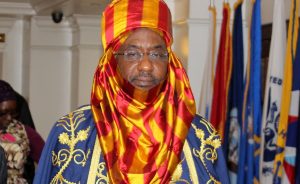‘They brought batons inside the mosque’: Victims recount Delhi’s worst sectarian violence in decades

The mob descended on the mosque in the Ashok Nagar neighborhood of New Delhi chanting praises to a Hindu deity, Jai Shri Ram, before beating up the imam and killing the muezzin, who was leading the call to prayer, Samar told CNN.”They brought batons and stones inside the mosque and the people outside had guns as well. We had to stop praying and run away,” Samar, whose eye was severely injured in the attack, said.Protesters hoisted a saffron flag, associated with Hindu far-right groups, from the mosque’s blackened minaret. The flag was only removed Wednesday morning after a CNN team asked police why it was still hanging there. Tuesday was the third consecutive night of deadly communal clashes in the capital between Hindus and minority Muslims over a divisive new citizenship law. More than thirty people have been killed since riots broke out on Sunday, according to a hospital spokesperson. It is the worst sectarian violence Delhi has seen in decades.The unrest, which coincided with a visit to India by US President Donald Trump, erupted between those demonstrating for and against the law that fast-tracks Indian citizenship for religious minorities of every faith other than Islam.Eyewitnesses told CNN that angry mobs targeted Muslim areas overnight on Tuesday, burning and looting homes and shops. Authorities deployed tear gas to disperse crowds, as protesters hurled stones and set surrounding property on fire, according to police. Lawyer Suroor Mander said that pellet bullets were also used by police.The death toll is expected to rise as the counting process continues, the chief casualty medical officer at Delhi’s Guru Tej Bahadur Hospital said Wednesday. One of the deceased was a police officer, who died from a bullet injury to the head.Since the violence began, at least 200 people have been treated in hospital, mostly for bullet injuries, and the rest from blunt force trauma, according to hospital officials.Delhi police, who are under the central government’s direct command, have been accused by witnesses of turning a blind eye to, or being complicit in, the violence. Police deny those claims.The mood was tense in New Delhi on Wednesday morning, as riot police patrolled the streets and the city’s highest elected official, Arvind Kejriwal, called for a curfew to be instated. Kejriwal said on Twitter that police were “unable to control (the) situation and instil confidence” despite ongoing efforts overnight, and requested that the military be called in.Indian Prime Minister Narendra Modi, whose Hindu national government has been accused of stoking religious tensions by introducing the citizenship law, appealed for peace on Wednesday.”Peace and harmony are central to our ethos. I appeal to my sisters and brothers of Delhi to maintain peace and brotherhood at all times,” Modi tweeted, breaking his silence.”It is important that there is calm and normalcy is restored at the earliest,” he added.’I am too scared to live here now’Trump’s state visit was hoped to demonstrate India’s prominence on the global stage. Instead, it put a spotlight on months of inflamed religious tensions.Protests have roiled India since December, when Modi backed the passage of the citizenship law. Many Indian Muslims point to it as an example of how the government has abandoned them, and say they feel victimized.The Prime Minister, whose Bharatiya Janata Party (BJP) was reelected in a landslide victory last year, has dominated Indian politics since first sweeping to power in 2014. While he has been hailed for his efforts to bring prosperity to poorer regions and root out corruption, his emphasis on empowering India’s Hindu majority has raised concerns.To Modi’s critics, the Citizenship Amendment Act has become the most brazen example of a Hindu nationalist agenda aimed at marginalizing Indian Muslims — part of an effort to tear at the fabric of India’s secular identity.Khurseed Alam, a rickshaw driver who lived next to the mosque in Ashok Nagar, said that Modi’s campaign promises of a prosperous future have proven empty. His family home, where he lived with 10 of his relatives, was burned by the mob, along with three other Muslim homes and neighboring shops.The head of the Delhi Fire Department told CNN that it had received 170 reports of arson in northeast Delhi over the last two days alone.”I used to work here in the market and earned around 500 rupees ($7). That’s also over now. What else can I do?” Alam asked, before saying sarcastically that these must be the “ache din,” or “good days,” that Modi had pledged during the 2014 election.Others living in the neighborhood said that they are fearful for their lives.Asana Begum was hiding with several other families in a nearby house as the mob tore through the area. She said that policemen eventually took them to safety, but when they returned home, nothing was left.”I am too scared to live here now. What can we rely on to live here? My daughters were to get married, we had collected all the things for them. They left nothing, we had collected the entire dowry but nothing is left,” Begum said.Speaking to the media on Wednesday, a Delhi Police spokesman said that 106 people had been arrested in connection with the incidents in northeast Delhi.”The miscreants are being identified. We have the CCTV footage and strong evidence,” the spokesman said.Police were patrolling northeast Delhi on Wednesday to reassure locals the situation was under control, the deputy commissioner of police for the district told CNN affiliate News 18, adding that there had been no further reports of arson.After visiting the riot-hit areas in East Delhi, India’s National Security Advisor Ajit Doval downplayed the violence, saying there was “no enmity” among locals and only “a few criminals” were responsible for fomenting trouble. “If Allah wills, there will be total peace here,” Doval said.CNN’s Esha Mitra contributed to this report from New Delhi.







